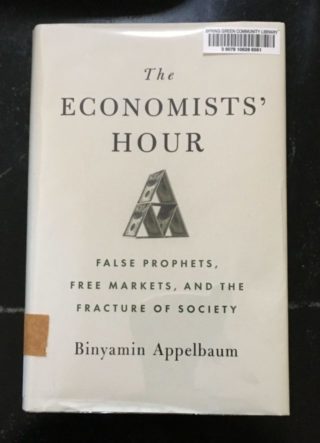The Economists’ Hour by Binyamin Appelbaum
This book is a great summary describing how the U.S. economic situation and policies developed to their present state. I lived through the period he describes as The Economists’ Hour (1969-2008) and can remember many of the events and changes he describes. He does a good job of tying it all together and putting it in perspective.
One of the changes he describes over this period is how Americans view themselves and how it affects economic policy. It used to be that most working Americans viewed themselves as producers – farmers, bakers, truck drivers, factory workers, etc. During that time public policy was geared to support local businesses and workers. At some point that changed to where most Americans now view themselves primarily as consumers, and public policy moved to maximize benefit to consumers. This favors large global corporations that can deliver goods at the lowest prices, often at the expense of their workers.
He contrasts the earlier economic policies largely based on the work of John Maynard Keynes with the work of economists at the University of Chicago, most prominently Milton Friedman. The shift was largely from the government having a hand in the marketplace to a much more hands-off approach where regulations are minimized. He describes how this shift happened over time and the effects this has had on the economy as a whole.
It is no secret that inequality has been growing in the U.S. and this has become a major political issue. This is particularly true compared to other countries, for example France. Most people would say that the U.S. economy outperformed that of France during the period he covers, and on average that is true for families as well. The average family in the U.S. had 32.2% real income growth over the period, compared to 27.1% for France. But if you remove the top 1% of households from that number, the numbers change to 17.9% real income growth for American families versus 26.4% for France.
I highly recommend this book. It can definitely give you one perspective on some of the reasons why things are the way they are.
